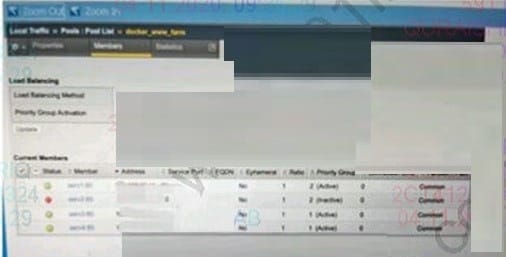Exam Details
Exam Code
:201Exam Name
:TMOS AdministrationCertification
:F5 CertificationsVendor
:F5Total Questions
:254 Q&AsLast Updated
:Mar 28, 2025
F5 F5 Certifications 201 Questions & Answers
-
Question 221:
Which cookie persistence method requires the fewest configuration changes on the web servers to be implemented correctly?
A. insert
B. rewrite
C. passive
D. session
-
Question 222:
A Standard Virtual Server configured for an application reports poor network performance. This application is accessed mainly from computers on the Internet.
What should the BIG-IP Administrator configure on the Virtual Server to achieve better network performance?
A. Protocol Profile (Client) with f5-tcp-wan and Protocol Profile (Server) with f5-tcp-lan
B. Protocol Profile (Client) with f5-tcp-lan
C. Protocol Profile (Client) with fS-tcp-lan and Protocol Profile (Server) with f5-tcp-wan
D. Protocol Profile (Client) with f5-tcp-optimized
-
Question 223:
The BIG-IP appliance fails to boot. The BIG-IP Administrator needs to run the End User Diagnostics (EUD) utility to collect data to send to F5 Support.
Where can the BIG-IP Administrator access this utility?
A. Console Port
B. Internal VLAN interface
C. External VLAN interface
D. Management Port
-
Question 224:
When can a single virtual server be associated with multiple profiles?
A. Never. Each virtual server has a maximum of one profile.
B. Often. Profiles work on different layers and combining profiles is common.
C. Rarely. One combination, using both the TCP and HTTP profile does occur, but it is the exception.
D. Unlimited. Profiles can work together in any combination to ensure that all traffic types are supported in a given virtual server.
-
Question 225:
The BIG-IP Administrator generates QKView using tmsh command "qkview -SO". In which directory does the BIG-IP appliance save the QKView?
A. /etc/tmp
B. /var/tmp
C. /shared/qkview
D. /var /tmp/qkview
-
Question 226:
New Syslog servers have been deployed in an organization. The BIG-IP Administrator must reconfigure the BIG-IP system to send log messages to these servers.
In which location in the Configuration Utility can the BIG-IP Administrator make the needed configuration changes to accomplish this?
A. System > Logs > Configuration
B. System > Configuration > Local Traffic
C. System > Logs > Audit
D. System > Configuration > Device
-
Question 227:
Assuming that systems are synchronized, which action could take place if the fail over cable is connected correctly and working properly, but the systems cannot communicate over the network due to external network problems?
A. If network failover is enabled, the standby system will assume the active mode.
B. Whether or not network failover is enabled, the standby system will stay in standby mode.
C. Whether or not network failover is enabled, the standby system will assume the active mode.
D. If network failover is enabled, the standby system will go into active mode but only until the network recovers.
-
Question 228:
A site has six members in a pool. All of the servers have been designed, built, and configured with the same applications. It is known that each client's interactions vary significantly and can affect the performance of the servers. If traffic should be sent to all members on a regular basis, which loadbalancing mode is most effective if the goal is to maintain a relatively even load across all servers?
A. Ratio
B. Priority
C. Observed
D. Round Robin
-
Question 229:
Refer to the exhibit.

Which Pool Members are receiving traffic?
A. Serv1, serv2,serv3, serv4
B. serv1, serv3
C. serv1, serv3, serv4
D. serv1
-
Question 230:
Which three iRule events are likely to be seen in iRules designed to select a pool for load balancing? (Choose three.)
A. CLIENT_DATA
B. SERVER_DATA
C. HTTP_REQUEST
D. HTTP_RESPONSE
E. CLIENT_ACCEPTED
F. SERVER_SELECTED
G. SERVER_CONNECTED
Related Exams:
101
Application Delivery Fundamentals201
TMOS Administration301A
BIG-IP LTM Specialist: Architect, Set up and Deploy301B
BIG-IP Local Traffic Manager (LTM) Specialist: Maintain & Troubleshoot771-101
Application Delivery FundamentalsF50-506
F5 FirePass 600 V5F50-531
BIG-IP v10.x LTM Essentials V10.xF50-536
BIG-IP ASM v10.x
Tips on How to Prepare for the Exams
Nowadays, the certification exams become more and more important and required by more and more enterprises when applying for a job. But how to prepare for the exam effectively? How to prepare for the exam in a short time with less efforts? How to get a ideal result and how to find the most reliable resources? Here on Vcedump.com, you will find all the answers. Vcedump.com provide not only F5 exam questions, answers and explanations but also complete assistance on your exam preparation and certification application. If you are confused on your 201 exam preparations and F5 certification application, do not hesitate to visit our Vcedump.com to find your solutions here.